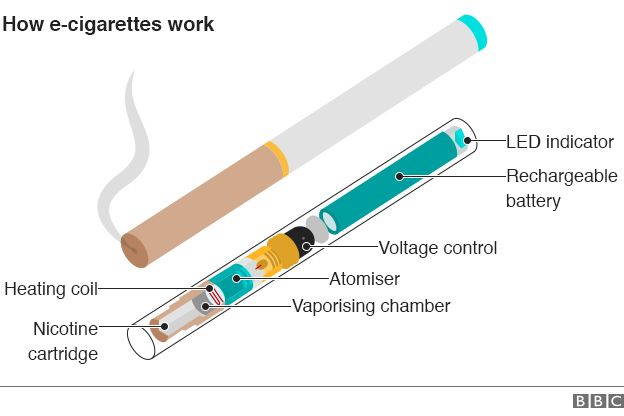The rise in popularity of e-cigarettes in the UK may have resulted in more successful attempts to quit smoking, according to UK researchers.
The British Medical Journal work looked at trends in quit rates and support in England from 2006 to 2015.
E-cigarettes seem to have had no effect on the number of people trying to quit, but more have actually managed to stop.

The authors say vaping may have helped about 18,000 extra people in England successfully give up smoking in 2015.
The team, from University College London and Cancer Research UK, say theirs is an observational study, and therefore cannot prove direct cause and effect.
One smoking expert said it appeared e-cigarettes were a “major contributor” to the trend.
But health professionals say the most effective way to quit smoking remains through prescription medication and professional support from free local NHS stop-smoking services.
Electronic cigarettes are not yet widely available on the NHS.
Rising Popularity
Sales of e-cigarettes have been rising steadily since they first went on sale in the UK, in 2007. They are now used by nearly three million people in the UK.
In the past few years, they have replaced nicotine patches and gum to become the most popular choice of smoking cessation aid in England.
The BMJ research looked at data from the Smoking Toolkit Study from 2006 through to 2015.
The study also took data from the NHS Stop Smoking Service.
During the period studied, just over eight million people set dates to quit smoking.
‘Something is working’
And the number of smokers who successfully managed to stop smoking increased by just under 1% for every 1% rise in the number of smokers using e-cigarettes.
Use of prescribed nicotine-replacement therapy also fell as e-cigarette use rose.

The team, led by Prof Robert West at UCL, said: “The increased prevalence of e-cigarettes in England does not appear to have been associated with a detectable change in attempts to stop smoking.
“However, the increase in e-cigarette use has been associated with an increase in success of quit attempts.”
Writing in the BMJ, John Britton, director of the UK Centre for Tobacco and Alcohol Studies at the University of Nottingham, said the results suggested e-cigarette use could contribute to falling smoking rates.
Smoking rates fell by 1% from 2014 to 2015.
Dr Britton said: “This significant year-on-year fall indicates that something in UK tobacco control policy is working, and successful quitting through substitution with e-cigarettes is one likely major contributor.”
Prof Linda Bauld, of Cancer Research UK, said: “The British public have voted with their feet and are choosing to use e-cigarettes. This is a positive choice, and we should promote it.”
Public Health England says e-cigarettes are 95% less harmful to your health than normal cigarettes, and when supported by a smoking cessation service, help most smokers to quit tobacco altogether.
BBC








